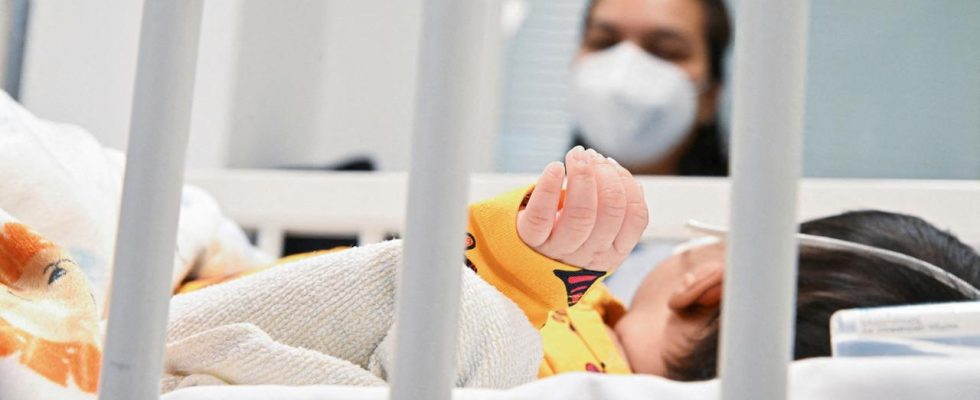Last winter, many babies and small children became ill with the RS virus. Now there are new vaccines – and experts expect the numbers to normalize.
After an enormous RSV wave in babies and small children last autumn and winter, experts are now expecting the number of cases to return to normal. The illnesses are likely to return to “normal levels” in the upcoming cool season, says Folke Brinkmann, head of the pediatric pulmonology section at the Clinic for Pediatric and Adolescent Medicine at the University Hospital Schleswig-Holstein. The number of children under one year old who were sick with the RS virus was five times higher in the fourth quarter of 2022 than in the same period in 2018, according to the Robert Koch Institute.
Catch-up infections in one- to two-year-olds who did not come into contact with RSV during the corona pandemic are expected to no longer be as pronounced. RSV is the abbreviation for “respiratory syncytial virus”, a respiratory pathogen.
A doctor at Berlin’s St. Joseph Hospital examines a baby with a respiratory infection.
Two new vaccines
In the past few months, two RSV vaccines have been approved in the EU for the first time – but not for children. They are intended for people aged 60 and over, and one of the two vaccines is also intended for pregnant women, with the aim of passing on the immune protection to the infant.
There is currently no recommendation from the Standing Vaccination Commission (STIKO) on the use of vaccines in Germany. This is no longer to be expected this fall, says STIKO member Klaus Überla. The expert committee is currently working on various aspects necessary for this, such as modeling the possible influence of vaccines on the spread of RSV in the population. It’s also about weighing up the risks and benefits. According to Überla, the reimbursement of the costs for the vaccination initially depends on the health insurance company. Especially with regard to the RSV vaccination of pregnant women, a very clear safety signal is initially necessary.
Uncertainty about vaccination recommendations
According to the experts, the reason for the reluctance so far are open questions about slightly more premature births in one of the studies on the very similar vaccines. Überla spoke of “statistically insignificant differences,” but they could be coincidental observations. But this certain uncertainty makes a general vaccination recommendation for all pregnant women initially difficult.
With regard to older patients, Überla, director of the Virological Institute at Erlangen University Hospital, said that use in seniors on an individual basis is conceivable, especially if there are many previous illnesses and therefore a high risk. For RSV, risk groups include premature babies and newborns, infants, children with pre-existing lung disease and heart defects, as well as adults over 65 and people with a compromised immune system.
Season from November to April
The typical RSV season runs from November to April. According to the Robert Koch Institute, the spread among the population was underestimated for a long time. Last fall and winter there was a severe RSV wave in many countries. Many children were affected who had previously had no contact with the pathogen because of the corona pandemic and the measures taken against it. Clinics and pediatrician practices were temporarily overloaded.

